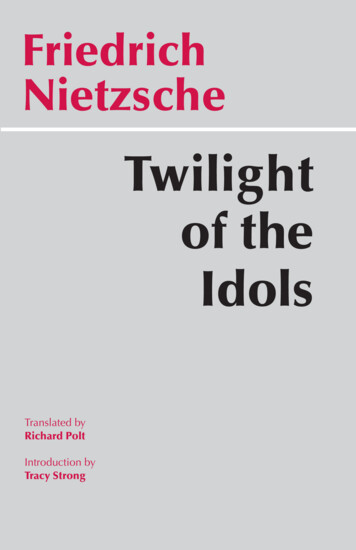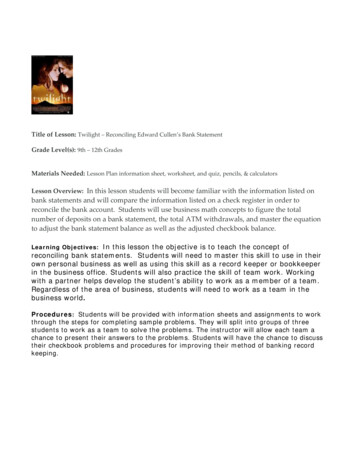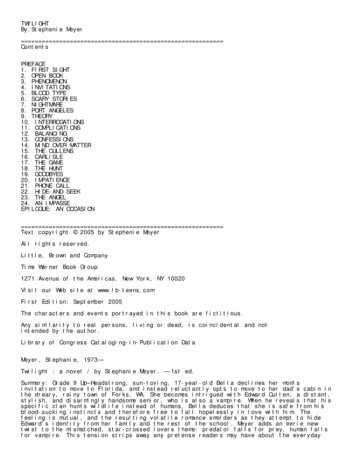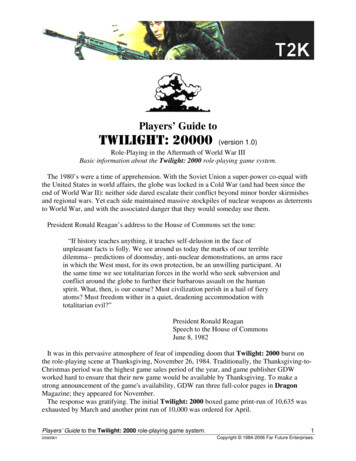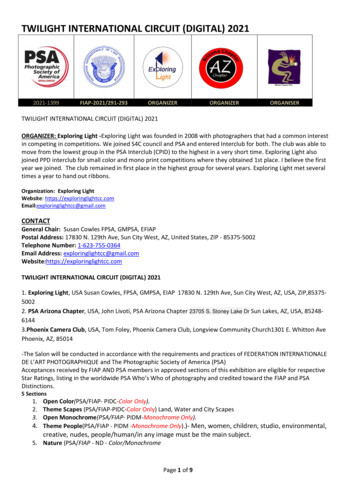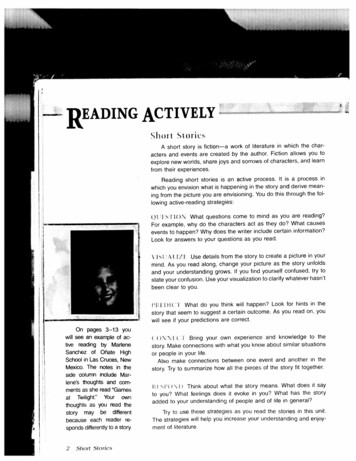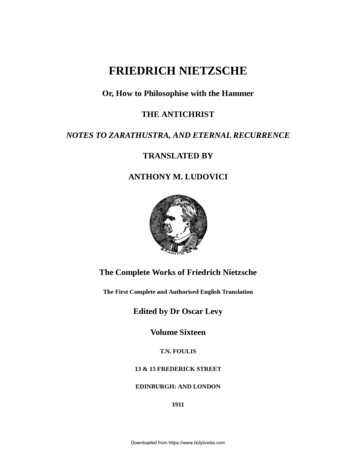
Transcription
FRIEDRICH NIETZSCHEOr, How to Philosophise with the HammerTHE ANTICHRISTNOTES TO ZARATHUSTRA, AND ETERNAL RECURRENCETRANSLATED BYANTHONY M. LUDOVICIThe Complete Works of Friedrich NietzscheThe First Complete and Authorised English TranslationEdited by Dr Oscar LevyVolume SixteenT.N. FOULIS13 & 15 FREDERICK STREETEDINBURGH: AND LONDON1911Downloaded from https://www.holybooks.com
CONTENTSTWILIGHT OF THE IDOLSTRANSLATOR'S PREFACEPREFACEMAXIMS AND MISSILESTHE PROBLEM OF SOCRATES"REASON" IN PHILOSOPHYMORALITY AS THE ENEMY OF NATURETHE FOUR GREAT ERRORSTHE "IMPROVERS" OF MANKINDTHINGS THE GERMANS LACKSKIRMISHES IN A WAR WITH THE AGETHINGS I OWE TO THE ANCIENTSTHE ANTICHRISTTHE ETERNAL RECURRENCENOTES TO ZARATHUSTRATRANSLATOR'S PREFACEThe Twilight of the Idols was written towards the end of the summer of 1888, itscomposition seems to have occupied only a few days,—so few indeed that, inEcce Homo (p. 118), Nietzsche says he hesitates to give their number; but, in anycase, we know it was completed on the 3rd of September in Sils Maria. Themanuscript which was dispatched to the printers on the 7th of September borethe title: "Idle Hours of a Psychologist"; this, however, was abandoned in favourof the present title, while the work was going through the press. DuringSeptember and the early part of October 1888, Nietzsche added to the originalcontents of the book by inserting the whole section entitled "Things the GermansLack," and aphorisms 32-43 of "Skirmishes in a War with the Age"; and thebook, as it now stands, represents exactly the form in which Nietzsche intendedto publish it in the course of the year 1889. Unfortunately its author was alreadystricken down with illness when the work first appeared at the end of January1889, and he was denied the joy of seeing it run into nine editions, of onethousand each, before his death in 1900.Downloaded from https://www.holybooks.com
Of The Twilight of the Idols, Nietzsche says in Ecce Homo (p. 118):—"If anyoneshould desire to obtain a rapid sketch of how everything before my time wasstanding on its head, he should begin reading me in this book. That which iscalled 'Idols' on the title-page is simply the old truth that has been believed inhitherto. In plain English, The Twilight of the Idols means that the old truth is onits last legs."Certain it is that, for a rapid survey of the whole of Nietzsche's doctrine, nobook, save perhaps the section entitled "Of Old and New Tables" in Thus SpakeZarathustra, could be of more real value than The Twilight of the Idols. HereNietzsche is quite at his best. He is ripe for the marvellous feat of thetransvaluation of all values. Nowhere is his language—that marvellous weaponwhich in his hand became at once so supple and so murderous—more forcibleand more condensed. Nowhere are his thoughts more profound. But all this doesnot by any means imply that this book is the easiest of Nietzsche's works. On thecontrary, I very much fear that, unless the reader is well prepared, not only inNietzscheism, but also in the habit of grappling with uncommon and elusiveproblems, a good deal of the contents of this work will tend rather to confusethan to enlighten him in regard to what Nietzsche actually wishes to make clearin these pages.How much prejudice, for instance, how many traditional and deep-seatedopinions, must be uprooted, if we are to see even so much as an important noteof interrogation in the section entitled "The Problem of Socrates"—not to speakof such sections as "Morality as the Enemy of Nature," "The Four Great Errors,"&c. The errors exposed in these sections have a tradition of two thousand yearsbehind them; and only a fantastic dreamer could expect them to be eradicated bya mere casual study of these pages. Indeed, Nietzsche himself looked forwardonly to a gradual change in the general view of the questions he discussed; heknew only too well what the conversion of "light heads" was worth, and whatkind of man would probably be the first to rush into his arms; and, grandpsychologist that he was, he guarded himself beforehand against bad companyby means of his famous warning:—"The first adherents of a creed do not proveanything against it."To the aspiring student of Nietzsche, however, it ought not to be necessary tobecome an immediate convert in order to be interested in the treasure of thoughtwhich Nietzsche here lavishes upon us. For such a man it will be quite difficultenough to regard the questions raised in this work as actual problems. Once,however, he has succeeded in doing this, and has given his imagination time toDownloaded from https://www.holybooks.com
play round these questions as problems, the particular turn or twist thatNietzsche gives to their elucidation, may then perhaps strike him, not only asvaluable, but as absolutely necessary.With regard to the substance of The Twilight of the Idols, Nietzsche says in EcceHomo (p. 119):—"There is the waste of an all-too-rich autumn in this book: youtrip over truths. You even crush some to death, there are too many of them."And what are these truths? They are things that are not yet held to be true. Theyare the utterances of a man who, as a single exception, escaped for a while thegeneral insanity of Europe, with its blind idealism in the midst of squalor, withits unscrupulous praise of so-called "Progress" while it stood knee-deep in thebelittlement of "Man," and with its vulgar levity in the face of effeminacy anddecay;—they are the utterances of one who voiced the hopes, the aims, and therealities of another world, not of an ideal world, not of a world beyond, but of areal world, of this world regenerated and reorganised upon a sounder, a morevirile, and a more orderly basis,—in fact, of a perfectly possible world, one thathas already existed in the past, and could exist again, if only the stupendousrevolution of a transvaluation of all values were made possible.This then is the nature of the truths uttered by this one sane man in the whole ofEurope at the end of last century; and when, owing to his unequal struggleagainst the overwhelming hostile forces of his time, his highly sensitivepersonality was at last forced to surrender itself to the enemy and become onewith them—that is to say, insane!—at least the record of his sanity had beensafely stored away, beyond the reach of time and change, in the volumes whichconstitute his life-work.Nietzsche must have started upon the "Antichrist," immediately after havingdispatched the "Idle Hours of a Psychologist" to the printers, and the workappears to have been finished at the end of September 1888. It was intended byNietzsche to form the first book of a large work entitled "The Transvaluation ofall Values"; but, though this work was never completed, we can form some ideafrom the substance of the "Antichrist" and from the titles of the remaining threebooks, which alas! were never written, of what its contents would have been.These titles are:—Book II. The Free Spirit. A Criticism of Philosophy as aNihilistic Movement. Book III. The Immoralist. A Criticism of the most FatalKind of Ignorance,—Morality. Book IV. Dionysus. The Philosophy of EternalDownloaded from https://www.holybooks.com
Recurrence.Nietzsche calls this book "An Attempted Criticism of Christianity." Modest asthis sub-title is, it will probably seem not quite modest enough to those whothink that Nietzsche fell far short of doing justice to their Holy Creed. Be this asit may, there is the solution of a certain profound problem in this book, which,while it is the key to all Nietzscheism, is also the justification and thesanctification of Nietzsche's cause. The problem stated quite plainly is this: "Towhat end did Christianity avail itself of falsehood?"Many readers of this amazing little work, who happen to be acquainted withNietzsche's doctrine of Art and of Ruling, will probably feel slightly confused atthe constant deprecation of falsehood, of deception, and of arbitrary makebelieve, which seems to run through this book like a litany in praise of a certainAbsolute Truth.Remembering Nietzsche's utterance in volume ii. (p. 26) of the Will to Power, towit:—"The prerequisite of all living things and of their lives is: that there shouldbe a large amount of faith, that it should be possible to pass definite judgmentson things, and that there should be no doubt at all concerning values. Thus it isnecessary that something should be assumed to be true, not that it is true;"—remembering these words, as I say, the reader may stand somewhat aghast beforeall those passages in the second half of this volume, where the very falsehoodsof Christianity, its assumptions, its unwarrantable claims to Truth, are declared tobe pernicious, base and corrupt.Again and again, if we commit the error of supposing that Nietzsche believed ina truth that was absolute, we shall find throughout his works reasons forcharging him with apparently the very same crimes that he here lays at the doorof Christianity. What then is the explanation of his seeming inconsistency?It is simple enough. Nietzsche's charge of falsehood against Christianity is not amoral one,—in fact it may be taken as a general rule that Nietzsche scrupulouslyavoids making moral charges, and that he emains throughout faithful to hisposition Beyond Good and Evil (see, for instance Aph. 6(Antichrist) where herepudiates all moral prejudice in charging humanity with corruption). A manwho maintained that "truth is that form of error which enables a particularspecies to prevail," could not make a moral charge of falsehood against any one,or any institution; but he could do so from another standpoint He could well say,for instance, "falsehood is that kind of error which causes a particular species todegenerate and to decay."Downloaded from https://www.holybooks.com
Thus the fact that Christianity "lied" becomes a subject of alarm to Nietzsche,not owing to the fact that it is immoral to lie, but because in this particularinstance, the lie was harmful, hostile to life, and dangerous to humanity; for "abelief might be false and yet life-preserving" (Beyond Good and Evil, pp. 8, 9).Suppose, therefore, we say with Nietzsche that there is no absolute truth, but thatall that has been true in the past which has been the means of making the "plantman flourish best"—or, since the meaning of "best" is open to some debate, letus say, flourish in a Nietzschean sense, that is to say, thanks to a mastery of life,and to a preponderance of all those qualities which say yea to existence, andwhich suggest no flight from this world and all its pleasure and pain. Andsuppose we add that, wherever we may find the plant man flourishing, in thissense, we should there suspect the existence of truth?—I If we say this withNietzsche, any sort of assumption or arbitrary valuation which aims at a reverseorder of things, becomes a dangerous lie in a super-moral and purelyphysiological sense.With these preparatory remarks we are now prepared to read aphorism 56 with acomplete understanding of what Nietzsche means, and to recognise in thisparticular aphorism the key to the whole of Nietzsche's attitude towardsChristianity. It is at once a solution of our problem, and a justification of itsauthor's position. Naturally, it still remains open to Nietzsche's opponents toargue, if they choose, that man has flourished best under the sway of nihilisticreligions—religions which deny life,—and that consequently the falsehoods ofChristianity are not only warrantable but also in the highest degree blessed; but,in any case, the aphorism in question completely exonerates Nietzsche from acharge of inconsistency in the use of the terms "truth" and "falsehood"throughout his works, and it moreover settles once and for all the exact altitudefrom which our author looked down upon the religions of the world, not only tocriticise them, but also to place them in the order of their merit as disciplinarysystems aiming at the cultivation of particular types of men.Nietzsche says in aphorism 56:—"After all, the question is, to what end arefalsehoods perpetrated? The fact that, in Christianity, 'holy' ends are entirelyabsent, constitutes my objection to the means it employs. Its ends are only badends: the poisoning, the calumniation and the denial of life, the contempt of thebody, the degradation and self-pollution of man by virtue of the concept sin,—consequently its means are bad as well."Thus, to repeat it once more, it is not because Christianity availed itself of allkinds of lies that Nietzsche condemns it; for the Book of Manu—which heDownloaded from https://www.holybooks.com
admires—is just as full of falsehood as the Semitic Book of Laws; but, in theBook of Manu the lies are calculated to preserve and to create a strong and nobletype of man, whereas in Christianity the opposite type was the aim,—an aimwhich has been achieved in a manner far exceeding even the expectations of thefaithful.This then is the main argument of the book and its conclusion; but, in the courseof the general elaboration of this argument, many important side-issues aretouched upon and developed, wherein Nietzsche reveals himself as somethingvery much more valuable than a mere iconoclast. Of course, on every page of hisphilosophy,—whatever his enemies may maintain to the contrary,—he neveronce ceases to construct, since he is incessantly enumerating and emphasisingthose qualities and types which he fain would rear, as against those he fainwould see destroyed; but it is in aphorism 57 of this book that Nietzsche makesthe plainest and most complete statement of his actual taste in Sociology, and itis upon this aphorism that all his followers and disciples will ultimately have tobuild, if Nietzscheism is ever to become something more than a merelyintellectual movement.ANTHONY M. LUDOVICI.PREFACETo maintain a cheerful attitude of mind in the midst of a gloomy and exceedinglyresponsible task, is no slight artistic feat. And y
The Twilight of the Idols was written towards the end of the summer of 1888, its composition seems to have occupied only a few days,—so few indeed that, in Ecce Homo (p. 118), Nietzsche says he hesitates to give their number; but, in any case, we know it was completed on the 3rd of September in Sils Maria. The manuscript which was dispatched to the printers on the 7th of September bore the .
